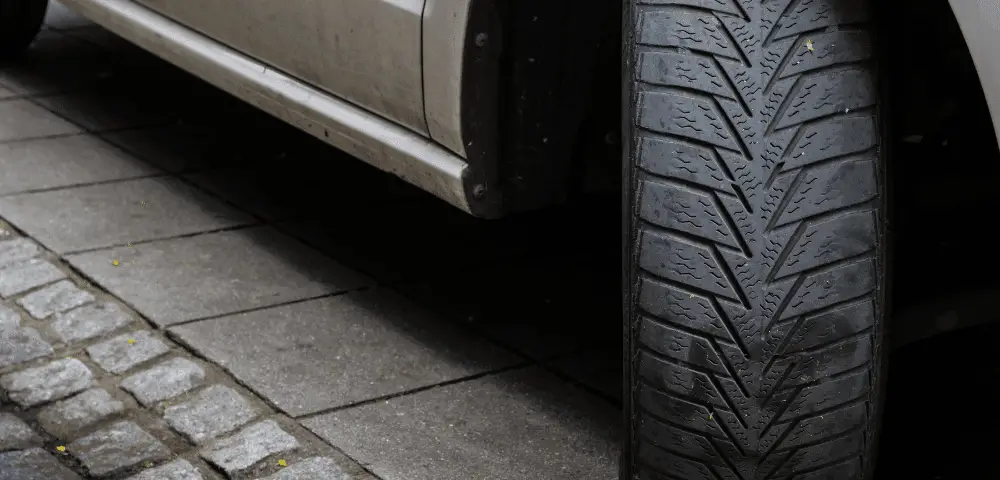You don’t have to be an expert to know that tire rubbing on any surface of your car’s body is not right. Tires rubbing when turning can create several problems for you. It looks unappealing, creates a safety hazard, and damages your tires.
Issues in suspension, aftermarket tires, or a change in wheel offset are some of the most likely causes of tire rubbing.
The following text will take a look at what you can do.
How to Check if My Tires are Rubbing?
Tires rubbing when turning or driving straight is quite hard to miss. It would definitely stick out like a sore thumb because of the sound it makes and the mark it leaves. You’d notice it both on your tires and the fender liner quite easily.
You’ll notice clear signs of rubbing on the internal side of the fender and the liner.
Repeat the same process for the other wheel by rotating the steering wheel to the next end and inspecting that side.
Potential Causes of Tires Rubbing
There can be many reasons why your tires are rubbing with any surface of your vehicle. If you’ve recently installed a new aftermarket part, a new wheel, and tire assembly, or a suspension component, then it is naturally the first place you should check out.
However, you may also start to hear a rubbing sound, especially when turning, without any apparent reason.
Here are some of the most common reasons why tires rub with your car’s body.
1. Suspension Issues
The elements that make up your car’s suspension come with a finite lifespan. Your shocks, springs, mounts, bushing, or any other elements might fail with use. Especially when you frequently travel on bumpy roads.
If you own an aged vehicle, have started to experience rubbing sounds without any changes to your tire or wheels, then get your suspension checked.
Things might look normal when the car is stationary but a failed suspension won’t have the damping capacity to handle the dynamic conditions of a drive.
Tires rubbing when turning is among the common indicators of a failed suspension.
2. Unusual Alignment
Misalignment is a regular occurrence if you drive off-road frequently.
Abnormal tire wear can also cause it, which can potentially lead to tire rubbing. Sometimes, extreme misalignment in your car’s caster angle can create a rubbing effect and cause damage.
3. Upsized Wheels or tires
Upsized wheels or tires are a common modification that people opt for. While it looks good, there can be a lot of problems. Suspension components, wheels, and other components are generally packed together.
If you are not careful, larger wheels or tires can rub with any of those close-proximity components and cause damage.
4. Wheel Offset
Aftermarket wheels that are not up to the OEM specifications may move laterally within the wheel well. Even if the diameter is the same, some automobile manufacturers add some other specifications as well.
This naturally causes rubbing as the space around tires is quite compact and there is very little tolerance for any deviations from the original design.
5. Wheels Spacers
Wheel spacers are a common aftermarket part that many car enthusiasts use. While installing wheel spacers allows larger wheels to be fitted to your vehicle, the larger wheel may still cause tire rubbing while turning or otherwise.
Tires Rubbing When Turning: Is It Bad?
There is no short answer to this. Rubbing naturally has some risks but in most cases, the damage is restricted solely to your car’s wheel well.
That is not dangerous but can increase your costs. Many enthusiasts accept this and believe that tires rubbing when turning is something acceptable given the performance and aesthetic advantages of larger tires.
If your tires are rubbing because of suspension issues or the damage is not limited to the wheel well only, then it’s a matter of concern.
It is quite dangerous as your tires or suspension components may fail and may cause further damage to the vehicle. In such cases, it’s quite important to rectify the issue as soon as possible.
Steps to Prevent Tire Rubbing
Depending on why your tires are rubbing, you can rectify the issue yourself or may need to approach a professional mechanic. No matter the reason, it’s always important to first understand the root cause of the issues before taking any action.
If your tires are rubbing because of suspension, then you can’t simply rectify the issue with a quick fix. What you’ll need is a proper mechanic to fix everything properly.
In other cases, fender roll, if done properly, can work like a charm. Here’s how to get started.
Step 1: Make Sure You Have the Right Tools
It goes without saying, but a lot of people make the mistake of getting started without having all the right tools. Make sure that’s not the case with you. Here’s what you’ll need.
- Wheel-arch reforming tool
- Heat gun
- Jack and jack stands
- Additional lug nuts
Step 2: Clean Out the Wheel Wells
Reversing adjustments on your wheel well is very difficult, so you must get things right the first time. Accumulated dirt and mud can hinder you, so it’s recommended to clean the wheel wells first.
Step 3: Remove the Wheel and Fender Liner
Step 4: Attach the Wheel-Arch Reforming Tool
Heat the fender before to protect the paint on your fender. The process can crack your paint if you’re not careful and heating minimizes the chances of that happening.
Step 5: Start Rolling the Fender Gradually
Make sure you are periodically applying heat on the fender to protect the paint.
Start rolling gradually and continue adjusting the angle of your tool until the desired clearance is achieved. Once you are done, reattach the liners and the wheel and you’ll be good to go.
Final Thoughts
Extreme modifications and aftermarket parts are among the most common causes of tire rubbing. If you are sure that your suspensions are in top condition, then a little rubbing won’t be dangerous.
Some enthusiasts even learn to accept it, there are many who want to continue deviating from the OEM design without dealing with their tires rubbing when turning the car.
For such cases, there are some options, but rolling the fender slightly seems to be the best solution.




